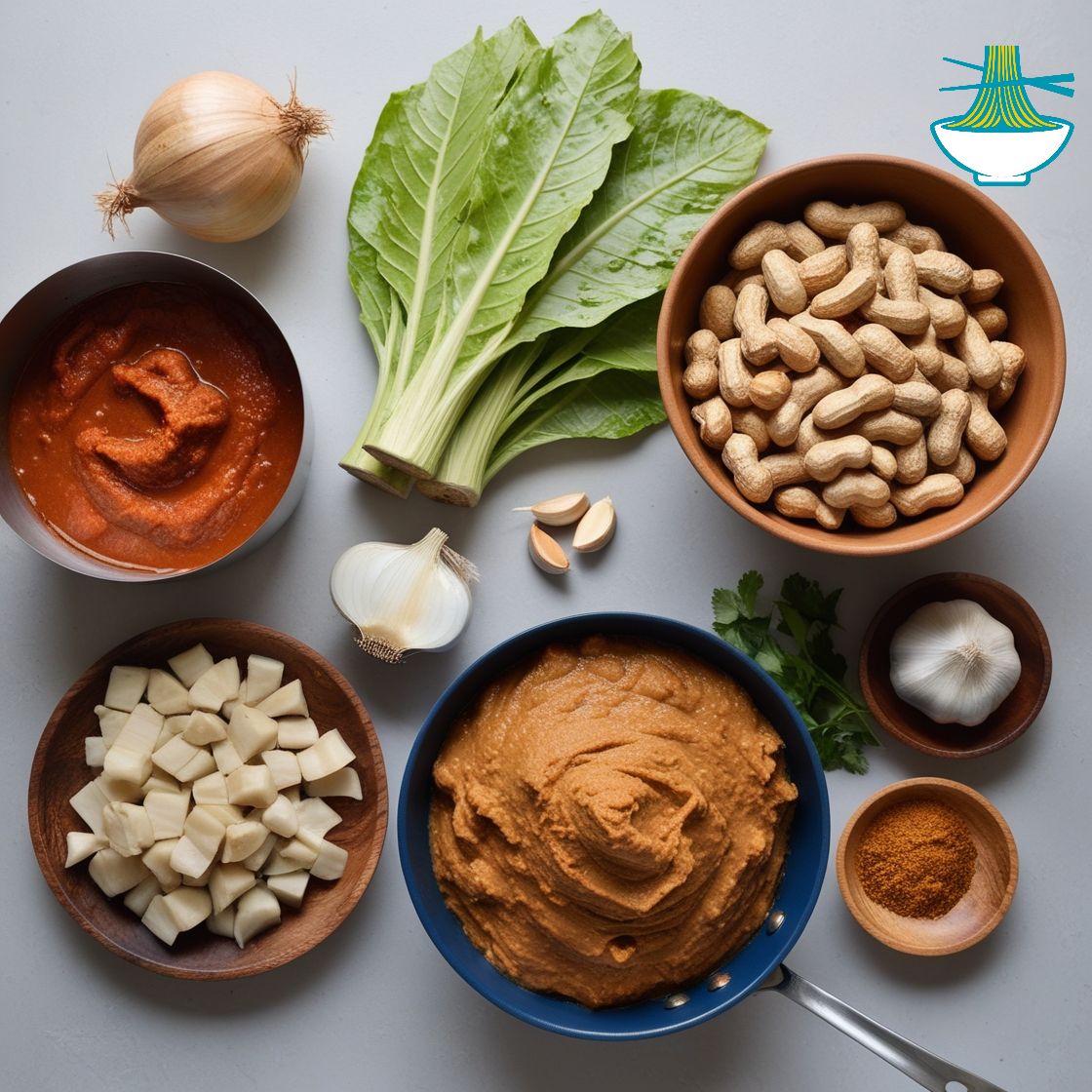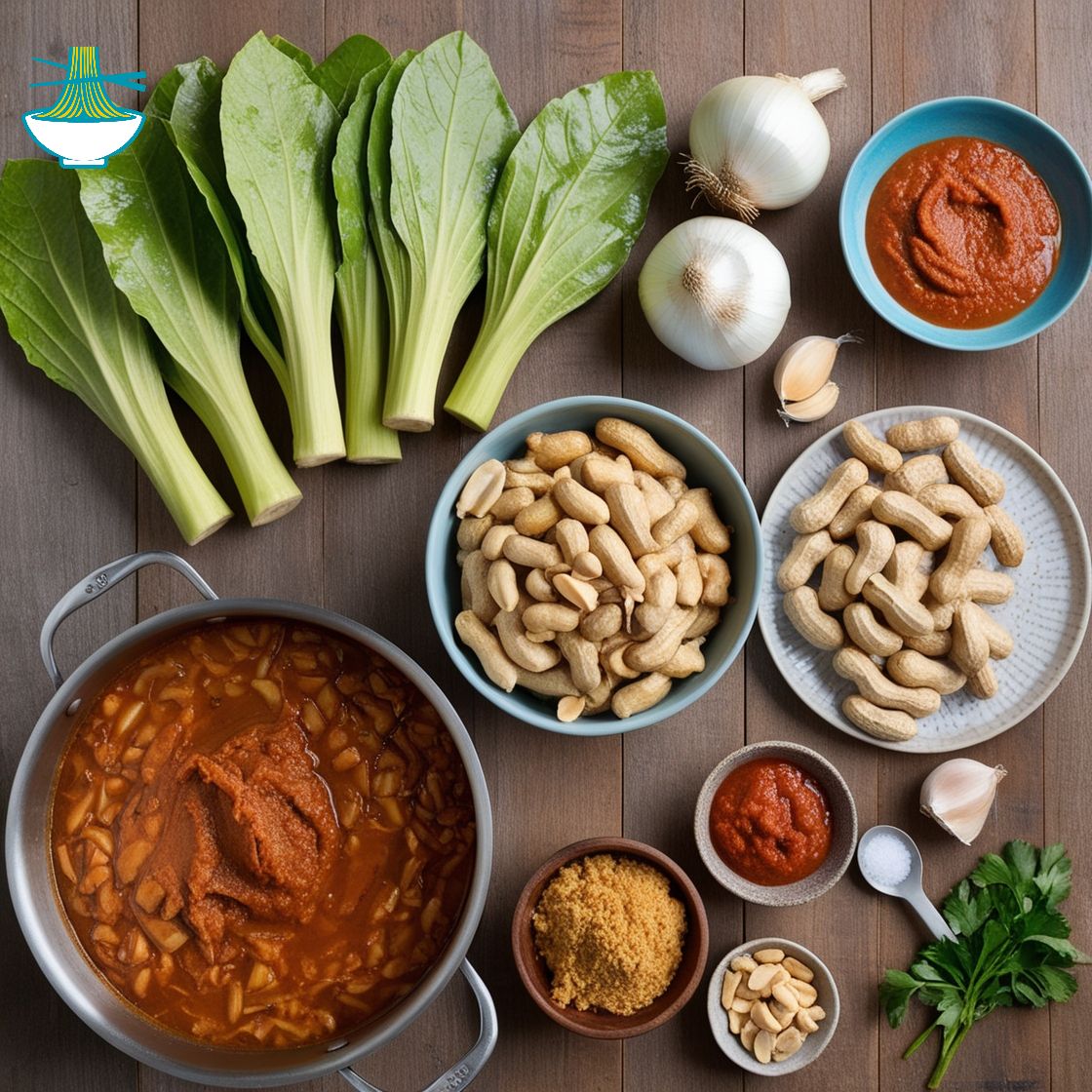Congo Pondu is a cherished dish in Central Africa, particularly popular in the Democratic Republic of Congo. It features cassava leaves and peanuts, offering a rich blend of flavors and nutritional benefits. This traditional dish is often served as a main course or side dish, ideal for communal meals with loved ones.

Congo Pondu is rich in fiber, vitamin C, folate, protein, and healthy fats from peanuts and palm oil. It provides substantial energy but should be enjoyed in moderation due to its calorie and fat content.
Originating from the resourceful use of cassava leaves and locally abundant peanuts, Congo Pondu reflects the culinary heritage of Central Africa. Its preparation varies regionally, often passed down through generations, embodying cultural traditions of communal dining and celebration.

Ingredients:
- 1-2 lbs. cassava leaves
- 1 lb. peanuts
- 2 onions
- 2 tablespoons tomato paste
- 2 cloves garlic
- 2 cups water
- Salt and pepper to taste
- 2 tablespoons palm oil
Method:
1. Prepare the Cassava Leaves:
- Wash the cassava leaves thoroughly, removing any tough parts.
- Chop the leaves into small pieces and set aside.
2. Prepare the Peanuts:
- Roast the peanuts in a dry skillet until golden brown.
- Let them cool, then remove the skins and grind into a smooth paste.
3. Cooking Process:
- Heat palm oil in a large pot over medium heat.
- Sauté chopped onions and garlic until golden brown.
- Add cassava leaves, mix tomato paste with water, and pour into the pot.
- Season with salt and pepper, simmer for 45-60 minutes, stirring occasionally.
4. Add Peanut Paste:
- After simmering, add the ground peanut paste to the pot.
- Stir well and continue cooking for another 10-15 minutes until flavors meld.
5. Serve:
- Serve hot with rice, plantains, or fufu.

Nutrition Value:
1. Cassava Leaves (1-2 lbs.):
- Calories: Approximately 110 calories per cup (boiled and drained).
- Carbohydrates: About 27 grams per cup.
- Protein: Provides about 1.4 grams per cup.
- Fat: Very low in fat content.
- Sodium: Minimal sodium content naturally.
- Cholesterol: Zero cholesterol.
- Vitamins and Minerals: High in vitamin C, folate, vitamin K, and manganese. Also contains calcium, phosphorus, and potassium.
- Nutritional Benefits: Cassava leaves are rich in antioxidants, fiber, and essential nutrients, supporting digestive health and immune function.
2. Peanuts (1 lb.):
- Calories: Approximately 828 calories per cup (dry roasted).
- Carbohydrates: About 24 grams per cup.
- Protein: Provides about 38 grams per cup.
- Fat: High in healthy fats (mainly monounsaturated and polyunsaturated).
- Sodium: Low in sodium.
- Cholesterol: Zero cholesterol.
- Vitamins and Minerals: Rich in vitamin E, niacin, folate, magnesium, and manganese. Contains smaller amounts of zinc, iron, and calcium.
- Nutritional Benefits: Peanuts offer energy-dense nutrition with heart-healthy fats, protein for muscle repair, and various vitamins and minerals crucial for overall health.
3. Onions (2 onions):
- Calories: Approximately 44 calories per medium onion.
- Carbohydrates: About 10 grams per medium onion.
- Protein: Provides about 1 gram per medium onion.
- Fat: Very low fat content.
- Sodium: Low sodium content.
- Cholesterol: Zero cholesterol.
- Vitamins and Minerals: High in vitamin C, vitamin B6, and potassium. Also contains folate, manganese, and phosphorus.
- Nutritional Benefits: Onions contribute antioxidants, anti-inflammatory compounds, and prebiotic fibers that support digestive health and immune function.
4. Tomato Paste (2 tablespoons):
- Calories: Approximately 30 calories per 2 tablespoons.
- Carbohydrates: About 7 grams per 2 tablespoons.
- Protein: Provides about 1 gram per 2 tablespoons.
- Fat: Very low fat content.
- Sodium: Contains some sodium.
- Cholesterol: Zero cholesterol.
- Vitamins and Minerals: Rich in vitamins A, C, and K. Also provides potassium and some calcium and iron.
- Nutritional Benefits: Tomato paste offers lycopene, an antioxidant linked to reduced risk of chronic diseases like heart disease and certain cancers.
5. Garlic (2 cloves):
- Calories: Approximately 4 calories per clove.
- Carbohydrates: About 1 gram per clove.
- Protein: Provides trace amounts.
- Fat: Very low fat content.
- Sodium: Very low sodium content.
- Cholesterol: Zero cholesterol.
- Vitamins and Minerals: High in vitamin C, vitamin B6, and manganese. Also contains trace amounts of calcium, potassium, phosphorus, and selenium.
- Nutritional Benefits: Garlic is renowned for its antimicrobial properties, antioxidants, and potential benefits for heart health and immune support.
6. Water (2 cups):
- Calories: Zero calories.
- Carbohydrates: None.
- Protein: None.
- Fat: None.
- Sodium: None.
- Cholesterol: None.
- Vitamins and Minerals: None.
- Nutritional Benefits: Essential for hydration and proper bodily functions. Water helps regulate body temperature, transport nutrients, and flush waste products.
7. Salt and Pepper (to taste):
- Nutritional Benefits: While salt and pepper are primarily used for flavoring rather than nutritional value, they can enhance taste perception and make nutritious dishes more palatable.
8. Palm Oil (2 tablespoons):
- Calories: Approximately 240 calories per 2 tablespoons.
- Carbohydrates: None.
- Protein: None.
- Fat: High in saturated fats.
- Sodium: Very low sodium content.
- Cholesterol: Zero cholesterol.
- Vitamins and Minerals: Contains vitamin E and small amounts of vitamin K.
- Nutritional Benefits: Palm oil provides energy-dense calories and is rich in vitamin E, which supports skin health and immunity.


Comments